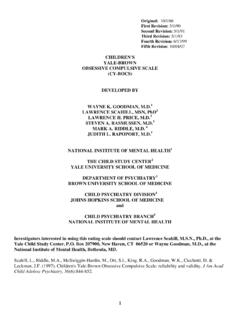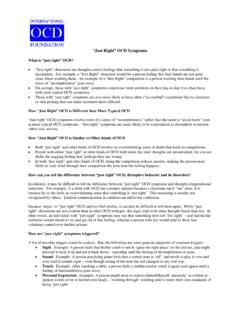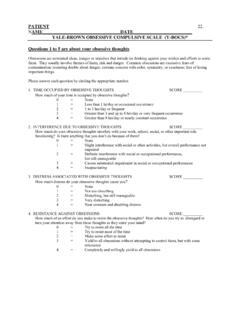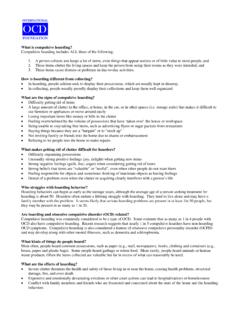Transcription of PATIENT 22. AME DATE YALE-BROWN OBSESSIVE …
1 PATIENT 22. NAME_____DATE_____ YALE-BROWN OBSESSIVE COMPULSIVE SCALE (Y- bocs )* Questions 1 to 5 are about your OBSESSIVE thoughts Obsessions are unwanted ideas, images or impulses that intrude on thinking against your wishes and efforts to resist them. They usually involve themes of harm, risk and danger. Common obsessions are excessive fears of contamination; recurring doubts about danger, extreme concern with order, symmetry, or exactness; fear of losing important things. Please answer each question by circling the appropriate number. 1. TIME OCCUPIED BY OBSESSIVE THOUGHTS SCORE _____ How much of your time is occupied by OBSESSIVE thoughts?
2 0 = None 1 = Less than 1 hr/day or occasional occurrence 2 = 1 to 3 hrs/day or frequent 3 = Greater than 3 and up to 8 hrs/day or very frequent occurrence 4 = Greater than 8 hrs/day or nearly constant occurrence 2. INTERFERENCE DUE TO OBSESSIVE THOUGHTS SCORE _____ How much do your OBSESSIVE thoughts interfere with your work, school, social, or other important role functioning? Is there anything that you don t do because of them? 0 = None 1 = Slight interference with social or other activities, but overall performance not impaired 2 = Definite interference with social or occupational performance, but still manageable 3 = Causes substantial impairment in social or occupational performance 4 = Incapacitating 3.
3 DISTRESS ASSOCIATED WITH OBSESSIVE THOUGHTS SCORE _____ How much distress do your OBSESSIVE thoughts cause you? 0 = None 1 = Not too disturbing 2 = Disturbing, but still manageable 3 = Very disturbing 4 = Near constant and disabling distress 4. RESISTANCE AGAINST OBSESSIONS SCORE _____ How much of an effort do you make to resist the OBSESSIVE thoughts? How often do you try to disregard or turn your attention away from these thoughts as they enter your mind? 0 = Try to resist all the time 1 = Try to resist most of the time 2 = Make some effort to resist 3 = Yield to all obsessions without attempting to control them, but with some reluctance 4 = Completely and willingly yield to all obsessions 23.
4 5. DEGREE OF CONTROL OVER OBSESSIVE THOUGHTS SCORE _____ How much control do you have over your OBSESSIVE thoughts? How successful are you in stopping or diverting your OBSESSIVE thinking? Can you dismiss them? 0 = Complete control 1 = Usually able to stop or divert obsessions with some effort and concentration 2 = Sometimes able to stop or divert obsessions 3 = Rarely successful in stopping or dismissing obsessions, can only divert attention with difficulty 4 = Obsessions are completely involuntary, rarely able to even momentarily alter OBSESSIVE thinking. The next several questions are about your compulsive behaviors. Compulsions are urges that people have to do something to lessen feelings of anxiety or other discomfort.
5 Often they do repetitive, purposeful, intentional behaviors called rituals. The behavior itself may seem appropriate but it becomes a ritual when done to excess. Washing, checking, repeating, straightening, hoarding and many other behaviors can be rituals. Some rituals are mental. For example, thinking or saying things over and over under your breath. 6. TIME SPENT PERFORMING COMPULSIVE BEHAVIORS SCORE _____ How much time do you spend performing compulsive behaviors? How much longer than most people does it take to complete routine activities because of your rituals? How frequently do you do rituals? 0 = None 1 = Less than 1 hr/day or occasional performance of compulsive behaviors 2 = From 1 to 3 hrs/day, or frequent performance of compulsive behaviors 3 = More than 3 and up to 8 hrs/day, or very frequent performance of compulsive behaviors 4 = More than 8 hrs/day, or near constant performance of compulsive behaviors (too numerous to count) 7.
6 INTERFERENCE DUE TO COMPULSIVE BEHAVIORS SCORE _____ How much do your compulsive behaviors interfere with your work, school, social, or other important role functioning? Is there anything that you don t do because of the compulsions? 0 = None 1 = Slight interference with social or other activities, but overall performance not impaired 2 = Definite interference with social or occupational performance, but still manageable 3 = Causes substantial impairment in social or occupational performance 4 = Incapacitating 24. 8. DISTRESS ASSOCIATED WITH COMPULSIVE BEHAVIOR SCORE _____ How would you feel if prevented from performing your compulsion(s)?
7 How anxious would you become? 0 = None 1 = Only slightly anxious if compulsions prevented 2 = Anxiety would mount but remain manageable if compulsions prevented 3 = Prominent and very disturbing increase in anxiety if compulsions interrupted 4 = Incapacitating anxiety from any intervention aimed at modifying activity 9. RESISTANCE AGAINST COMPULSIONS SCORE _____ How much of an effort do you make to resist the compulsions? 0 = Always try to resist 1 = Try to resist most of the time 2 = Make some effort to resist 3 = Yield to almost all compulsions without attempting to control them, but with some reluctance 4 = Completely and willingly yield to all compulsions 10.
8 DEGREE OF CONTROL OVER COMPULSIVE BEHAVIOR SCORE _____ How strong is the drive to perform the compulsive behavior? How much control do you have over the compulsions? 0 = Complete control 1 = Pressure to perform the behavior but usually able to exercise voluntary control over it 2 = Strong pressure to perform behavior, can control it only with difficulty 3 = Very strong drive to perform behavior, must be carried to completion, can only delay with difficulty 4 = Drive to perform behavior experienced as completely involuntary and over- powering, rarely able to even momentarily delay activity.
9 TOTAL SCORE _____ Y- bocs Symptom ChecklistInstructions: Generate a Target Symptoms List from the attached Y- bocs Symptom Checklist byasking the PATIENT about specific obsessions and compulsions. Chock all that apply. Distinguish betweencurrent and past symptoms. Mark principal symptoms with a "p". These will form the basisof the Target Symptoms List. Items marked may * or may not be an OCD COMPULSIONSE xcessive or ritualized handwashingExcessive or ritualized showering, bathing,toothbrushing grooming, or toilet routine Involvescleaning of household items or other inanimate objectsOther measures to prevent or remove contact withcontaminantsOtherCHECKING COMPULSIONSC hecking locks, stove, appliances that did rot/will not harm othersChecking that did not/will not harm selfChecking that nothing terrible did/will happenChecking that did not make mistakeChecking tied to somatic obsessionsOther.
10 REPEATING RITUALSR ereading or rewritingNeed to repeat routine activities jog, in/out door,up/down from chair)Other _____COUNTING COMPULSIONS_____ORDERING/ARRANGING COMPULSIONS_____ HOARDING/COLLECTING COMPULSIONS(distinguish from hobbies and concern with objects of monetary orsentimental value ( , carefully reads junk mail, piles up old newspapers,sorts through garbage, collects useless objects.)_____MISCELLANEOUS COMPULSIONSM ental rituals (other than checking/counting)Excessive listmakingNeed to tell, ask, or confessNeed to touch, tap, or rub*Rituals involving blinking or staring*Measures (not checking) to prevent: harm to self -harm to others terrible consequencesRitualized eating behaviors*Superstitious behaviorsTrichotillomania *Other self-damaging or self-mutilating behaviors*OtherCurrent PastSOMATIC OBSESSIONSC oncern with illness or disease*Excessive concern with body part or aspect ofAppearance (eg.)









